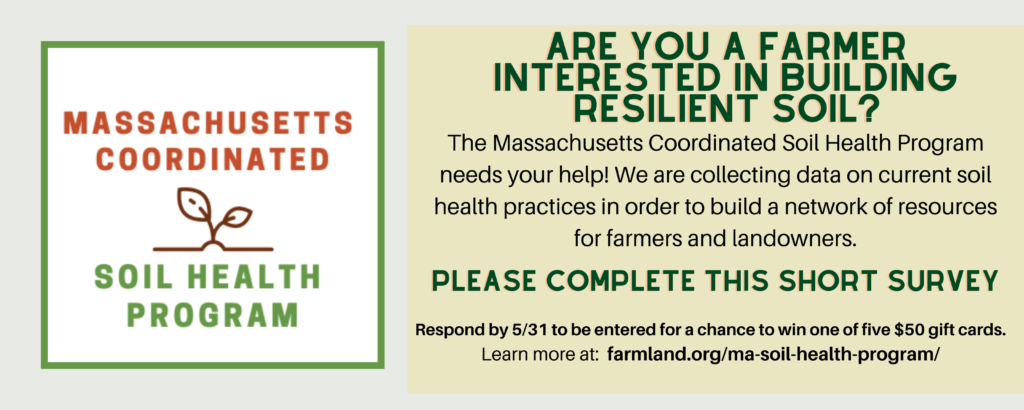The Massachusetts Coordinated Soil Health Program Encourages Soil Health Adoption in Farmers Across the Commonwealth.
American Farmland Trust to partner with MDAR and NOFA/Mass on comprehensive soil health program.
Northampton, MA – Today, American Farmland Trust, in partnership with the Massachusetts Department of Agricultural Resources (MDAR) and NOFA/Mass, announced a comprehensive soil health program, incentivizing farmers throughout Massachusetts to adopt regenerative agriculture practices with the goal of improving resilience to climate change and farm viability. The Massachusetts Coordinated Soil Health Program will focus on both organic and conventional farmers to better understand the current resources and practices being utilized. The program will encourage the implementation of cover crops, no-till, nutrient management, and other soil health management practices.
More than 54% of Massachusetts cropland is currently dedicated to hay or corn for silage (USDA). Meanwhile, vegetables are the second largest crop acreage in the state. Yet, both the vegetable and dairy industries’ established presence has not buffered the economic impact of declining milk prices and a log jammed supply chain for vegetables and dairy products. With improved production methods and soil health practices, Massachusetts farms can strengthen their financial standing and reduce the risk of climate change impacts, setting them up for greater stability and presence in our local food system.
There are many barriers to implementing comprehensive soil health practices for any type of farm operation, whether they be financial or technical. However, there is considerable interest from farmers who are not currently utilizing cover crops or reduced tillage in learning about the benefits, and how to integrate these practices into their operations. The Massachusetts Coordinated Soil Health Program seeks to provide financial assistance including no-cost soil health assessments, free technical assistance, and on-farm learning events to share information on no-till and cover crop benefits, to influence the likelihood of adopting these practices.
“AFT is thrilled to help establish a soil health program for the State of Massachusetts that can serve farmers and provide support in their soil health journeys. Better soil health means greater yields, more resilience to climate change impacts, such as extreme weather events, and increased pest pressure. Improved soil health means increased farm viability and land tenure for farmers across the Commonwealth.” Dr. Emily Cole, New England Deputy Director.
The program brings together a solid advisory team of farmers, soil health experts, and agency partners, all of whom provide knowledge and resources on how to best provide the farmers in the Commonwealth with the financial and technical assistance necessary to overcome the many identified barriers. UMass Amherst Stockbridge School of Agriculture will be supporting this work by conducting soil health analysis for farmers interested in understanding more about the state of their soil’s health.
“Soil health is a critical but also advanced area of understanding for both farmers and scientists. Projects like this provide a unique opportunity to not just study the science of soil health, but to actually see how the science holds up on the farm. That’s what we do in the Stockbridge School – we put science to work.” Dr. Masoud Hashemi, Extension Professor, Stockbridge School of Agriculture.
“The organic movement is centered around healthy soils practices,” said NOFA/Mass Policy Director Marty Dagoberto. “We are excited to partner with AFT and MDAR in order to scale out these practices for the benefit of all farmers and our biosphere.”
“Healthy soil is not only a fundamental building block for all agricultural practices, but employing healthy soil practices also contributes to climate change mitigation,” said MDAR Commissioner John Lebeaux. “MDAR is pleased to partner with AFT and NOFA to further advance healthy soil concepts that will support the Baker-Polito Administration’s environmental and climate goals, and benefit farmers’ bottom lines.”
Goals of the project include:
- Identify the barriers to soil health practice adoption through farmer interviews and surveys, and input from service providers.
- Organize soil health focused events for farmers across the state. The first event in the series, “No-Till Tools for Small Scale Farmers” is put on by NOFA/Mass and will take place at Long Life Farm in Hopkinton, MA on May 16th. Register at nofamass.org/events. Attendance is limited for safety and a video recap will be posted on Youtube following the event. Establish two on-farm soil health demonstration projects to track soil health changes and economic impacts and to serve as real-life examples for other Massachusetts farmers.
- Establish a robust database cataloging soil health status across the Commonwealth across a wide variety of production systems, soil types, and farming practices, helping to inform locally relevant agricultural research.
- Provide farmers with no-cost soil health assessments and technical assistance.
- Share the lessons learned from farmers, soil health evaluations, and project outcomes to generate resources including videos, factsheets, soil health case studies and reports, providing valuable information about soil health, climate resilience, and the economic viability of Massachusetts farms.
Providing farmers with resources to build health soils is crucial in combating climate change and maintaining a robust food system in Massachusetts. To learn more about the project, visit https://farmland.org/ma-soil-health-program/
If you, or someone you know, is a farmer in Massachusetts interested in building resilient soil, please take this brief survey to help us gather information on your current soil health practices. Participants who respond before May 31st will be entered to win one of five $50 gift cards. Survey can be found here:
https://www.surveymonkey.com/r/MASoilHealth
##
American Farmland Trust is the only national conservation organization dedicated to protecting farmland, promoting environmentally sound farming practices and keeping farmers on the land. Since 1980, AFT’s innovative work has helped to permanently protect more than 6.8 million acres of farmland and ranchland and led the way for the adoption of conservation practices on millions more. No Farms, No Food. Learn more at www.farmland.org.


